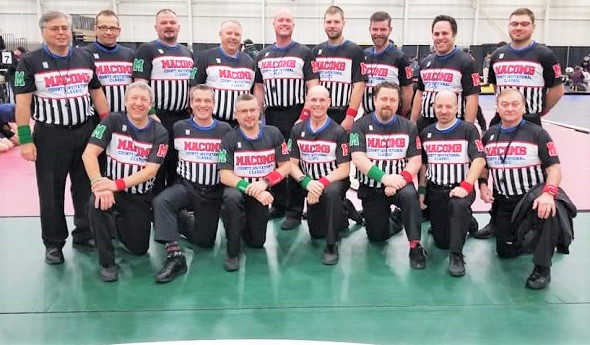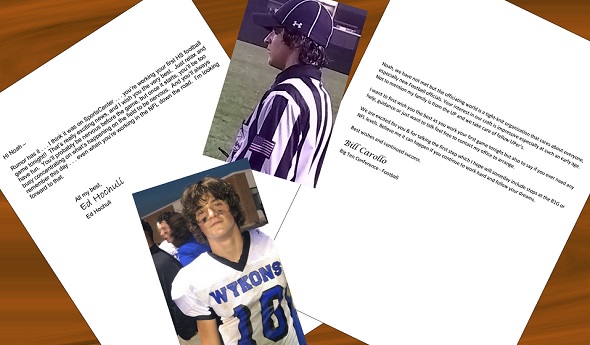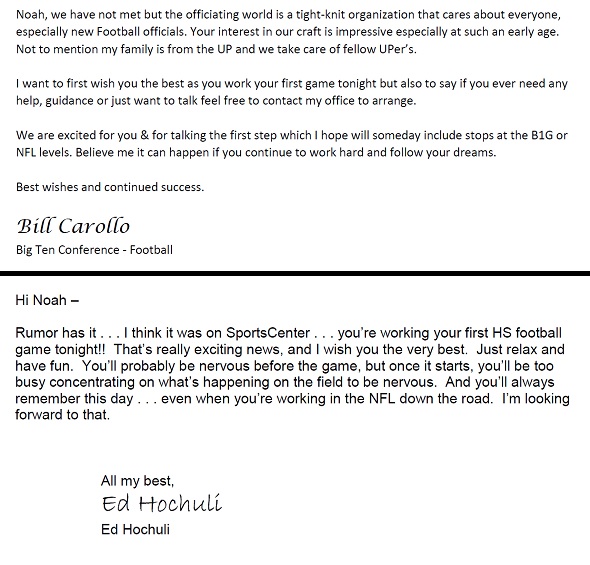
The Official View: Don't Make it Personal
By
Brent Rice
MHSAA Assistant Director
January 15, 2019
By Brent Rice
MHSAA Assistant Director
Statistics tell us poor sportsmanship is a leading factor in officials leaving officiating and a major impediment to recruiting new officials. The official catching flak is not new.
This week’s “It’s Official” discusses work being done to bring civility to high-intensity situations where criticism of officials has frequently turned personal.
It’s Official!
Poor Sportsmanship and the Official
 As long as there have been officials, there has been dissatisfaction with officials by players and coaches. It’s not that instances of poor sportsmanship are becoming more frequent – it’s that these instances are becoming more personal. And in part because of the accessibility of social media, they are more sensationalized.
As long as there have been officials, there has been dissatisfaction with officials by players and coaches. It’s not that instances of poor sportsmanship are becoming more frequent – it’s that these instances are becoming more personal. And in part because of the accessibility of social media, they are more sensationalized.
The great Major League Baseball veteran umpire Harry Wendelstedt regularly used to say, “You may yell at the uniform, but you can’t yell at me.” His point recognizes not everyone will agree with the calls officials make, but that criticism and disapproval should be directed about the call and not about the person.
Some sports have ejectable offenses specific to that sport. Others – think soccer, volleyball, basketball or football – have a progressive system of fouls that lead to an automatic ejection. This doesn’t mean, though, that coaches and players receive a one-time free pass to say whatever they want. Personal attacks are not permitted and are grounds for immediate disqualification. Personal attacks include:
• Offensive or derogatory remarks about an official’s (real or perceived) gender, ethnicity, sexual orientation, age, religion or disability.
• Threats or intimidation of physical violence, withdrawing games or a downgrade of ratings.
• Personal insults that disparage an individual or openly question an official’s integrity, impartiality, honesty or character.
For example, instead of using the personal insult “You’re terrible!” that would result in an immediate ejection, players and coaches could substitute the impersonal “That’s terrible!” The use of “you” or “you’re” personalizes the attack, and anything that follows those words in a disparaging manner almost always will result in a disqualification.
While the onus of ensuring good sportsmanship is primarily the responsibility of administrators, coaches and players, the officials also play a significant role by enforcing behavior and conduct rules through penalization. Officials are being instructed to strictly enforce this policy moving forward. To emphasize the importance of avoiding personal attacks on officials, the MHSAA will be starting the new campaign “Get Personal … Get Ejected!” We are looking for help from coaches, players and spectators in showing respect and appreciation for the hardworking men and women who officiate MHSAA contests by keeping criticisms brief and absent of personal attacks.
 Sports Officials Appreciation
Sports Officials Appreciation
The MHSAA is seeking ways we can show appreciation for the contribution Registered officials provide to the MHSAA and its member schools. This will soon include the introduction of an “Official Thanks” campaign and providing schools a framework to institute “Officials Appreciation” events.
To further express our gratitude, the MHSAA has partnered with the Detroit Red Wings to host a Sports Officials Night on Sunday, March 31 beginning at 7:30pm. The package includes a specially-priced Red Wings ticket, souvenir cooling towel and access to a pre-game speaking engagement with former professional officials. Additional benefits also are being worked on. Details are posted on the Officials page of the MHSAA website and will be delivered to all officials via email.
Rule of the Week
GIRLS COMPETITIVE CHEER As Team A attempts a swinging stunt during Round 3, the flyer is propelled into an almost-vertical position with her feet in the air and head near the floor.
Ruling: This is an illegal stunt and an 8-point deduction per infraction.
It’s Your Call
BASKETBALL This week’s clip shows Team A in white attempting to move the ball up court against Team B’s press. A pass is made to #11 near the division line. What’s the call?
Last IYC Ruling: In the last “It’s Your Call” clip, the attacking wrestler picks up his opponent and slams him to the mat. This is a dangerous act, and a flagrant misconduct should have been assessed. (Click to see video.)
Official View: Giving Back
Every year, the Macomb County Coaches Association and area officials come together to host a Christmas Tournament where funds are raised for educational scholarship opportunities. This year’s event was another huge success.
For officials, it’s a great time to give back and enjoy the sport they love. Tradition has been that custom uniform shirts are purchased for the officials, who also wear their best (or worst) pair of Christmas socks.
Pictured above are: (Back row) Phil Lieblang, Lenny Gino, Chad Davinich, Dave Hall, Bryan Legree, Josh Orzechowski, Mike Billiu, Matt Stabley, Brandon Orzechowski. (Front row) Eugene English, Gary Kowalewski, Jerry Angelo, Ron Minoletti, Rob Peltier, Eric Siefert, Jim Niemiec.

The Official View: Just the Beginning
By
Brent Rice
MHSAA Assistant Director
September 24, 2018
By Brent Rice
MHSAA Assistant Director
This week’s “Official” View features a Legacy official who received a couple of very cool letters of encouragement from some very important people in recognition of his first MHSAA football contest.
Noah Lewis, out of Iron River, plays wingback and cornerback for West Iron County. This past Thursday night he served as a head linesman for a subvarsity game with close monitoring from his dad from the sidelines and the rest of the crew.
However, letters from NFL veterans Ed Hochuli and Bill Carollo also provided him some unexpected sage advice. Hochuli told Noah to “Just relax and have fun,” while Carollo offered to be there for Lewis for guidance or to provide a listening ear.
It’s Official!
Report Writing 101: Officials should be submitting incident reports whenever documenting ejections, unusual situations, or sportsmanship praises or concerns. While we certainly don’t need reports that would challenge Dickens in the writing department (we do get some of these), we do need enough detail that a clear picture is painted of the event for those administrators and directors in the Association office who are not present for the actual incident.
The who, what, where, when, and why of writing all apply. We need to know who is involved (name and number), what occurred leading up to the incident, when it occurred during the contest and why the official took the action he or she did.
Language counts … while we appreciate your discreetness when foul language occurs, please write what was said and done in detail – this includes writing out profanities in the report rather than “#^$*@^~!” or “bleeping.”
As Joe Friday would say, “Just the facts.” We don’t need any fluff or opinion. This means you don’t need to say that the play was close, that you got it right, the day was “blustery” or that “the coach was clearly out of control.” Tell us just the things we need to know to create the setting and what was said and done that led to your action.
Finally, you must complete the report within 48 hours of the end of the contest. Sooner would be better. There is nothing worse than trying to speak to a coach or administrator about an incident when we don’t even have the side of the official(s) yet.
P.S. Run your report through spell and grammar check before submitting if you have the opportunity.
Rule of the Week
CROSS COUNTRY One of the visiting coaches approaches the referee and points out to her where logs have been placed across the course to make it more challenging. This coach objects to these artificial barriers.
Ruling: These artificial barriers on the course must be removed so the course is clear of these obstructions.
It’s Your Call
FOOTBALL This week we look at the enforcement of the blindside block foul in football. It’s 3rd-and-21 on Team A’s 26-yard line. The slot receiver, #8 for white, clearly commits a blindside block in violation of the rules. With forceful contact, he blocks an opponent who does not see the blocker approaching.
One of the keys to look for in this play on the field is offensive players returning back towards the line of scrimmage. The question this week is: What is the down and distance if Team B (a) accepts (b) declines the penalty?
Last Week’s IYC Ruling: The swimmer did not make a legal turn since he took additional strokes after turning toward the breast. While swimmers may turn and independently kick or glide after their head passes the backstroke flags, they may not take any additional arm pulls other than in the actual turning action (8-2-f-1).
The Official View
Here's a closer look at those notes received by Noah Lewis, the aspiring Legacy Program official from Iron River:


